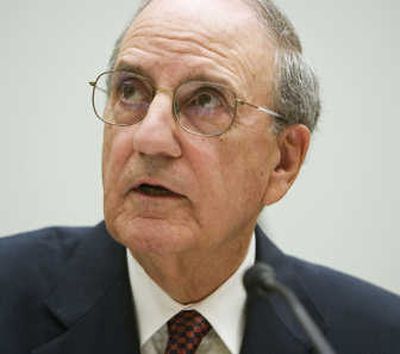Congress resumes talk about baseball steroids

WASHINGTON – Taking on baseball’s steroids problem once again, Congress kept the finger-pointing and tough questioning to a minimum. Maybe that’s because the people under the most scrutiny this time – Miguel Tejada, Barry Bonds and Roger Clemens – were nowhere to be seen.
Commissioner Bud Selig and union leader Donald Fehr accepted responsibility for the sport’s drug boom and the author of the Mitchell Report defended his findings in the same wood-paneled House hearing room that hosted a far longer and far more contentious session in March 2005.
It didn’t take long for the focus to shift to players on Tuesday.
The hearing opened with word that Congress wants Tejada, the 2002 A.L. MVP, investigated for lying to federal authorities. The first witness, former Senate majority leader George Mitchell, testified he believes a former trainer’s allegations that he injected seven-time Cy Young Award winner Clemens with steroids and human growth hormone. Selig told lawmakers that Bonds’ San Francisco Giants should have reported concerns about the home run king’s personal trainer.
The 4-hour, 15-minute session before the House Oversight and Government Reform Committee also exposed what might be the latest drugs abused by the sport’s stars: Ritalin and Adderall, stimulants better known as treatments for hyperactive kids. According to data provided to the committee by MLB and the union, a copy of which was obtained by the Associated Press, there were 35 “Therapeutic Use Exemptions” for drugs in 2006, of which 28 were for ADD and ADHD medications. In 2007, the exemptions skyrocketed to 111, of which 103 were for ADD and ADHD.
“It seems to be a little bit odd, said Dr. Gary Wadler, chairman of the committee that determines the World Anti-Doping Agency’s banned-substances list. “I’m the guy who made the issue three years ago about amphetamines, and baseball said they didn’t have a problem with greenies.”
One of Mitchell’s recommendations was that baseball needs an independent agency to handle drug testing, and the data about ADD drugs supports that, Wadler said.
Overall, though, Selig and Fehr found a far friendlier audience than they did on March 17, 2005, when they were chastised and grilled by the same committee for a lax steroids program. That 11-hour hearing is best remembered for Mark McGwire’s infamous and oft-repeated phrase, “I’m not here to talk about the past,” and Rafael Palmeiro’s finger-wagging denial of steroid use only months before failing a drug test.
In the aftermath of the 2005 hearing, baseball and the union agreed to toughen their drug policy, including harsher penalties, more testing and a ban on amphetamines.
In his opening statement, Selig vowed to do more, including testing top prospects before the amateur draft. He also reiterated a willingness to test for human growth hormone “when a valid, commercially available and practical test for HGH becomes reality, regardless of whether the test is based on blood or urine.”
Fehr, in turn, said the union has agreed to “allow players to be suspended for HGH use based on evidence other than a positive test.”
He and Selig said they met in December to discuss the Mitchell Report’s recommendations and plan to meet again.
Not every exchange with the lawmakers was easy.
“This scandal happened under your watch. I want that to sink in,” Maryland Democrat Elijah Cummings told Selig and Fehr. “Do you accept responsibility for this scandal or do you think there was nothing you could do to prevent it?”
Fehr paused for several seconds.
“Did we or did I appreciate the depth of the problem? … The answer is, ‘No,’ ” Fehr replied. “It’s a failure that we didn’t, and it’s a failure that I didn’t.”
Selig then followed, saying that he’s agonized over the question.
“Do I wish we could have reacted quicker? Should we have? One could make the case,” the commissioner said. “All of us have to take responsibility, starting with me.”
Before any testimony, committee chairman Henry Waxman announced he and ranking Republican Tom Davis asked the Justice Department to look into whether Tejada lied to committee staffers when questioned in connection to Palmeiro’s perjury case in 2005.
“Tejada told the committee that he never used illegal performance-enhancing drugs and that he had no knowledge of other players using or even talking about steroids,” Waxman said. “Well, the Mitchell Report, however, directly contradicts key elements of Mr. Tejada’s testimony.”
Palmeiro said his positive test might have resulted from a B-12 vitamin injection given to him by Tejada – at the time, a teammate on the Baltimore Orioles – and the committee concluded there was insufficient evidence to refer Palmeiro’s case to the Justice Department.
In the Mitchell Report, Adam Piatt, Tejada’s former teammate with the Oakland Athletics, said he provided Tejada with steroids and HGH in 2003. Mitchell also included copies of checks allegedly written by Tejada to Piatt in March 2003 for $3,100 and $3,200.
“We will review and respond to the letter from Chairman Waxman and Rep. Davis,” Justice Department spokesman Peter Carr said.
Waxman raised Bonds’ name during Selig’s appearance, asking the commissioner whether the Giants should have reported their concerns about Bonds’ trainer, Greg Anderson, and the slugger’s alleged steroid use to the commissioner’s office.
“Of course,” Selig responded.
Pressed by Waxman about whether Giants general manager Brian Sabean violated baseball rules by not doing so, Selig said: “It’s a matter that I have under review,” perhaps hinting that Sabean or other team officials could face discipline.
Since last month’s release of the Mitchell Report, the focus largely has been on Clemens, who has been asked to testify at a Feb. 13 hearing, along with his former trainer, Brian McNamee. Clemens has vehemently denied McNamee’s allegations.
“You continue to feel comfortable with Mr. McNamee’s credibility?” Waxman asked.
“We believe that the statements provided to us were truthful,” Mitchell said.